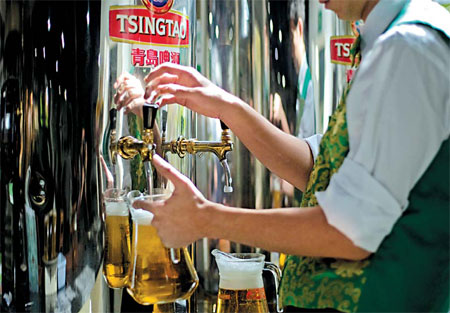


In the 1980s' nearly all companies were State-run and few people knew what overseas listings mean. But Tsingtao Brewery Company Ltd was brewing an internal restructuring and later listed its shares on Hong Kong stock exchange.
The Shandong province-based beer manufacturer's breakthrough listing on July 15, 1993 made it the first-ever mainland company to sell shares in Hong Kong and sparked a decade of large scale capital formation by mainland enterprises.
"It was like a primary student who suddenly went to a university. Everything was brand new and it was hard to adapt," Yuan Lu, an assistant of Tsingtao's board chairman, who was in charge of the company's investor relationship at the time, was quoted by Merchants Weekly as saying.
Since then Tsingtao has learned what it means to be a public firm. Rather than following a State-run enterprises' operation pattern, it was required to maintain a transparent company system, submit timely standard annual and interim reports as well as release announcements and statements on significant issues.
Those rules, which are generally accepted international standards, were new to State-run enterprises in those days, Yuan recalls.
Tsingtao's milestone listing was followed by Sinopec Shanghai Petrochemical Co, Ma Steel and Yizheng Chemical Fiber Co Ltd, which, like Tsingtao, were responding to the central government's call to build a market-oriented economy.
"The market was not well-regulated at that time; the mainland didn't have company law and securities law and foreign investors didn't know much about mainland companies," says Lorraine Chan, a spokeswoman at Hong Kong Exchange and Clearing (HKEx), the city's bourse operator.
"We used to first add rules to their regulations to make them meet the HKEx's threshold for listing candidates," Chan tells China Business Weekly.
Because the China Securities Regulatory Commission was established only before Tsingtao's IPO the brewer had no laws or practices to follow except for a guidebook compiled by the National Economic System Reform Commission.
Even its prospectus book was a bit "plain". "The company has 3,960 staff workers the annual turnover was 809 million yuan for 1992," Tsingtao said in a statement issued to Hong Kong share subscribers in 1993. By contrast, 15 years later, it recorded a 7.79 billion yuan turnover for the first-half of 2008.
About one month after its Hong Kong debut, Tsingtao floated its shares on the Shanghai stock market. The listing helped the company raise HK$889 million and 638 million yuan respectively. Subsequently, the company's debt to asset ratio was greatly trimmed to 29 percent from 70 percent.
Changing listing perspective
Mainland companies listed in Hong Kong in the early 1990s had different reasons than their peers who listed in Hong Kong in recent years, Chan said.
"Many of the early birds' reasons were mainly to raise money to fuel their development, while companies came to Hong Kong later with other various goals. A lot of them took an IPO in Hong Kong as an effective way of brand-name building, or as a springboard for them to explore international markets."
According to Edmond Chan, a partner of capital market services group at PricewaterhouseCoopers, the mainland companies were also doing it at the behest of the central government.
"They did it because the government told them to and the process was strictly under the control of authorities," Chan says.
In September 1992 following former leader Deng Xiaoping's spring tour of southern China to encourage market reform, nine State-owned enterprises were selected by the National Economic System Reform Commission to conduct share restructuring for overseas share sales.
"The authorities carefully sifted through State-owned enterprises and chose those with good quality assets or with famous trademarks like Tsingtao as road testers," Chan says.
The government doesn't treat overseas listings as an experiment now and companies can decide for themselves whether a share sale is needed, he says.
Moreover, the Chinese authorities now encourage companies to list all their holdings on the market rather than the "presentable spin-offs" like they used to, since the listing candidates need to be mature enough to face the market forces.
Positive interaction
Tsingtao improved its competitiveness by listing in Hong Kong, says Li Guirong, former chairman of the brewery.
"We were obliged to conduct thorough share restructuring. Because we list our shares overseas, things must be internationalized," Li was quoted by Wen Wei Pao newspaper as saying.
Ten years ago Hong Kong-listed mainland companies, or H-share companies, took up less than 20 percent of Hong Kong stocks' total market value, according to statistics from the HKEx. That compares to today when eight out of the 15 largest players by market value are mainland companies.
(China Daily 12/22/2008 page7)













